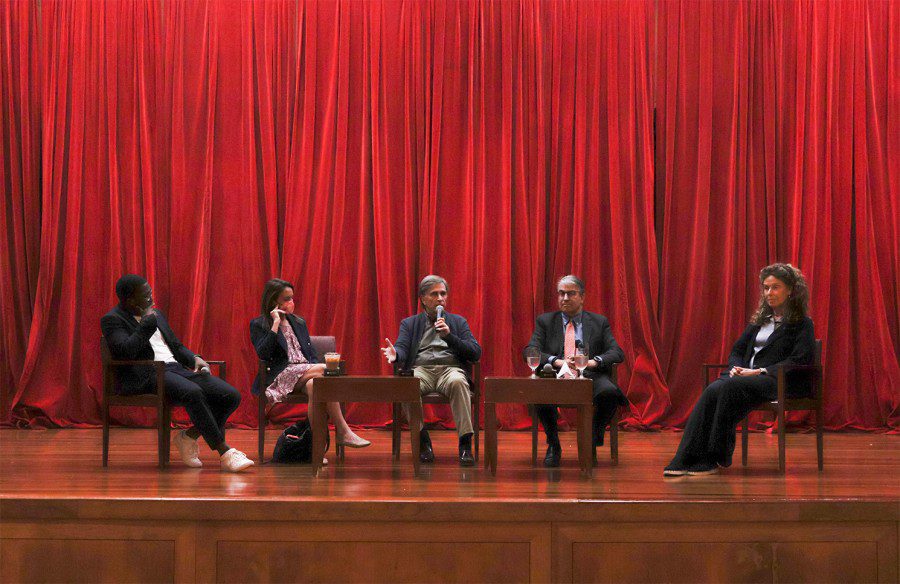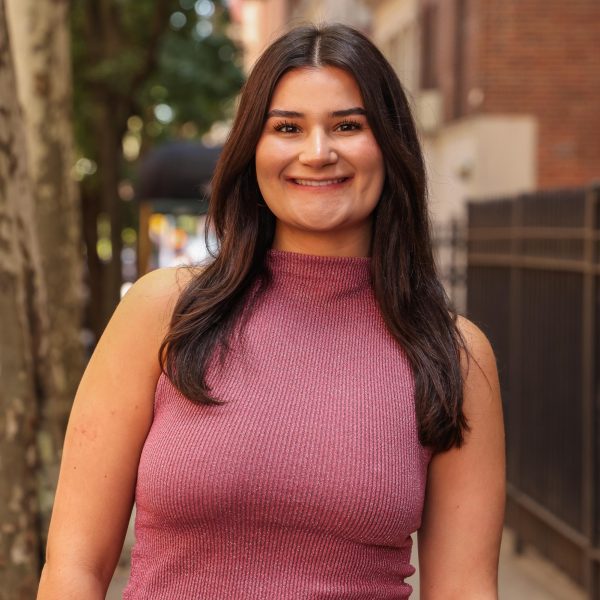Search for Hamilton successor sparks little student enthusiasm
A committee that was assembled to find NYU President Andrew Hamilton’s successor has begun hosting hearing sessions to collect input from the university community, but has seen little student involvement so far.
Only one student attended a hearing held by NYU’s Presidential Search Committee on Monday, Sept. 19. (Andy Lee for WSN)
September 21, 2022
A Presidential Search Committee, formed after current university President Andrew Hamilton announced in April that he would step down at the end of the 2022-23 academic year, is in the process of gathering community input through several restricted-access hearing sessions. The committee has welcomed students, faculty, staff and alumni to the hearings, where they have an opportunity to learn more about the presidential search process and share what they would like to see from Hamilton’s successor.
The selection process has seen scant involvement from students. Only one was in attendance at the first hearing that was open to students on Sept. 19 and none were in attendance at another hearing later that day, which was open to the entire NYU community. The lack of participation in this year’s search process is reminiscent of the beginning stages of Hamilton’s recruitment, when hearing session attendees expressed concerns about low faculty engagement. Other recent recruitment processes — including the search for the next CAS dean during the 2021-22 academic year — have also seen low student involvement.
Ron Hall, the chair of NYU’s student government and the only student member of the search committee, encouraged students to participate in the selection process in any way that they can.
“The selection of a president is one of the most critical decisions a university can make in influencing its direction,” Hall wrote to WSN. “If their schedule permits, I urge students to attend a listening session to share what they want to see in the university’s next president.”
Hamilton announced that he would be stepping down from the position on April 13, after eight years in the role. After taking a sabbatical, he plans to return to the university to teach as a professor in the College of Arts & Science chemistry department. He attributed the decision in part to the recent birth of his fifth grandchild and his 70th birthday, which is coming up on Nov. 3.
The committee to select Hamilton’s successor — which, along with Hall, is comprised of 27 faculty members, deans, administrators and trustees — is conducting the search in partnership with Isaacson Miller, an executive recruitment firm. At one of the Sept. 19 hearings, John Muckle, a representative from the firm, also said that the committee wants the NYU community to participate more in the search process. He added that comments, suggestions and nominations of potential candidates help the firm and committee make an informed decision.
The committee will continue to compile a list of nominees through Nov. 1. Community members can submit recommendations or provide input on the process online or via email no later than Oct. 1. The search committee also established a separate website where community members can share comments, ideas and questions regarding the process and Hamilton’s successor. The website opened for feedback on Sept. 15 and will remain available through Sept. 30, and an NYU Net ID and password are needed to access the second site.
Evan Chesler, a member of NYU’s board of trustees and vice chair of the committee, said that the group is interested in hearing more about what the university community wants to see in a new leader during one of the Sept. 19 hearings. He specifically mentioned considerations including whether the university should hire internally versus externally and whether there were specific preferences on what the candidates’ professional experiences should include.
“Our goal is to try to narrow that universe of people down to those who we believe have characteristics and qualities that are consistent with those that we’re looking for,” Chesler said. “As a search committee, what we’re focused on is what we are looking for in terms of talent and ability in the next president, and that’s one of the things we’d like to hear from the students.”
According to a position profile compiled by a previous search committee in 2014, a candidate for the role the NYU president is someone who can articulate a vision for the university, promote diversity and inclusion and “affirm NYU’s position as a global leader,” among a list of other expectations. The profile, which will be revised to reflect the needs and expectations of the university community for the next president throughout the search process, also lists several qualifications including academic distinction, managerial experience and fundraising ability.
D Simmons Jendayi, the associate director of Special Initiatives in NYU’s Liberal Studies program, said that the committee should prioritize diversity when selecting a new president. She said that all former university presidents have been white men.
“The friends that I do have that are university presidents — particularly Black presidents and Latinx presidents — they talk about not only being the first, but also being positioned for success,” Jendayi said. “What is the support that that person gets? Those are some of the things that I think about in terms of giving feedback on what I think the president should possess in order to succeed.”
Former NYU President John Sexton announced in 2013 that he would step down from the position at the end of the 2015-16 academic year, giving the university three years to decide upon a successor. Sexton, who had previously served as the dean of NYU Law, was university president for 14 years.
The search for Sexton’s successor also began with the formation of a search committee, which held its first meeting in September 2014. In addition to the chair of the board of trustees, the committee was composed of 13 trustees, nine faculty members and two students. The group then organized a number of listening sessions to engage with the university community, which informed the construction of the aforementioned job description, which is publicly available.
The search committee and Isaacson Miller — a consulting firm which NYU also partnered with during the search to replace Sexton — then assessed the potential candidates for the role. When they had narrowed their options down to one candidate, they then brought that candidate to the board of trustees for ratification. After it had been ratified by the board, Hamilton’s presidency was approved on March 18, 2015 — over one year before Sexton was to formally step down.
The presidential committee to find Hamilton’s successor has held five open faculty hearing sessions so far, with one more on Oct. 6 that plans to focus specifically on diversity and inclusion. There are two more upcoming open student sessions — one online on Sept. 23 and the other in person on Sept. 29 — and an alumni session on Oct. 6. Additionally, the committee hosted a session that was open to staff and administration on Sept. 19 and plans to host one more on Sept. 22. There are also opportunities for students, faculty, administration and alumni from NYU Shanghai and NYU Abu Dhabi to engage with the committee, with events scheduled up until Sept. 27.
Contact Bruna Horvath and Rylee La Testa at [email protected].

























































































































































